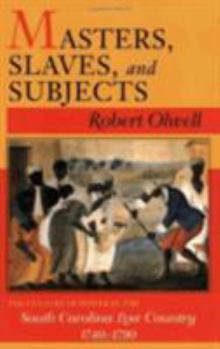Masters, Slaves, and Subjects: The Culture of Power in the South Carolina Low Country, 1740 1790
Select Format
Select Condition 
Book Overview
The slave societies of the American colonies were quite different from the "Old South" of the early-nineteenth-century United States. In this engaging study of a colonial older South, Robert Olwell analyzes the structures and internal dynamics of a world in which both masters and slaves were also imperial subjects. While slavery was peculiar within a democratic republic, it was an integral and seldom questioned part of the eighteenth-century British...
Format:Paperback
Language:English
ISBN:080148491X
ISBN13:9780801484919
Release Date:June 1998
Publisher:Cornell University Press
Length:320 Pages
Weight:0.95 lbs.
Dimensions:0.9" x 6.0" x 8.9"
Age Range:18 years and up
Grade Range:Postsecondary and higher
Customer Reviews
2 ratings
Very interesting book; good research
Published by Thriftbooks.com User , 18 years ago
Robert Olwell investigates the relationship between slaves and their masters, beginning with the Stono Rebellion in 1740 and concluding after the Revolutionary War. The rebellion consisted of several slaves leading a proposed march from South Carolina to Spanish Florida, pillaging plantations on their way and gathering slave recruits. They had barely begun when the slaveholders formed a militia and crushed the insurgents. Throughout the fifty years following the Stono Rebellion, slaveholders found it in their best interests from the points of view of finances and sanity to give the slaves a certain degree of respect. Slaves usually had at least one day off, grew their own produce, generally were not sold separate from their families, and so on. Furthermore, slaveholders discovered during minor battles prior to the Revolutionary War against Indians, France, and Great Britain, that slaves would side with their masters to keep the slave family together. In a sense, then, a partnership developed, with dissimilar but aligned goals. Within that, however, both sides sought to maximize their own agenda whenever possible. Over the course of his book, Olwell gives examples in terms of justice, religion, the marketplace, and war. Slaves could not expect much justice in criminal proceedings against them. If they were accused of a crime, especially against a white person, the punishment was often death, with little or no inquiry as to their guilt. If slaves showed genuine remorse for their act (again, regardless of whether or not they actually did it), and their act was not especially severe, the courts frequently were lenient. Consequently, slaves quickly learned to be repentant if they were accused of a crime. Regarding religion, slaveholders would have liked to convert their slaves to Christianity, but as the story of Moses leading God's people out of Egypt suggests, many Christian lessons contradicted colonial practice. Therefore, they tried to involve the slaves in the church, but kept them largely ignorant. Missionaries were on a tight leash, often only able to stay for a year. Few slaves actually converted, at one point around five percent, and these their owners handpicked. Those that converted frequently did so not for religious reasons, but rather to gain favor with their owner and thereby achieve a higher quality of life. One area in which slaves actually gained an advantage over whites was in the marketplace. They were allowed to sell goods they had made, produce they had grown, and, if their masters had no need of them for the day, themselves. In this fashion, they manipulated the market to achieve a kind of equality; if whites refused to pay the price they asked, they refused to sell. This was especially true in the latter example, selling day-labor, as the demand was quite high. Slaveholders often tried to get a cut of the sales, and went to great lengths to get it, but slaves proved adept at not paying. Throughout a
A beautifully written account of colonial SC's culture.
Published by Thriftbooks.com User , 26 years ago
Robert Olwell, a recognized authority on the early history of South Carolina, has written a fresh account of that colony's cultural development. Focusing on the tension between the cultural standards emanating from the English metropole and the slave society that developed on the shores of a strange continent, Olwell provides an intriguing perspective on the formation of colonial power relations. Olwell begins his study with an overview of South Carolina's history from the Stono slave uprising in 1739 through the Revolutionary period. Subsequent chapters explore, in turn, the legal system, the Anglican church, the market economy, the plantation household, and the revolution against English authority. Olwell eases the reader into his sophisticated analysis by opening each chapter with anecdotes emphasizing the human and personal element of history. A talented writer, the author manages to present his incredibly thorough research without numbing the reader to the compelling drama of this period. In short, this book should be required reading for anyone interested in the history of South Carolina, the history of slavery in colonial America, and the relationship between the colonial American elite and the English and African cultures that spawned South Carolina's society in the New World.






